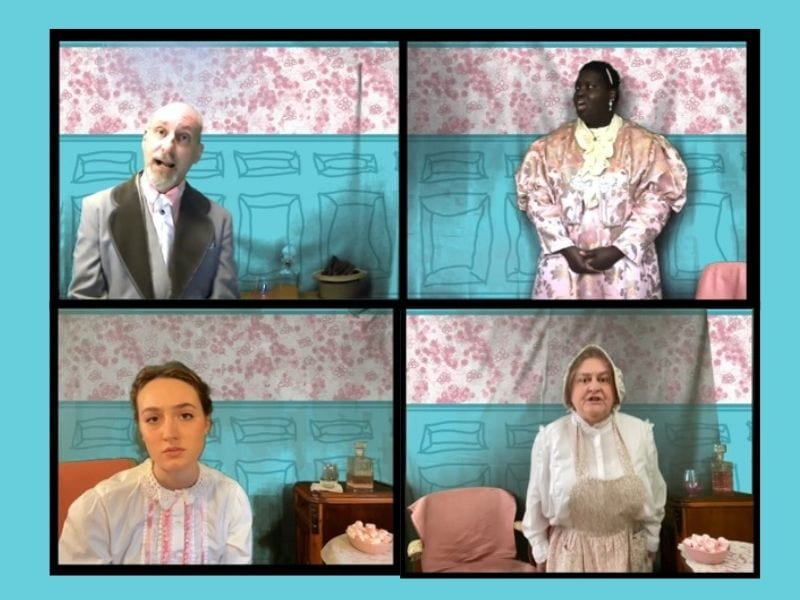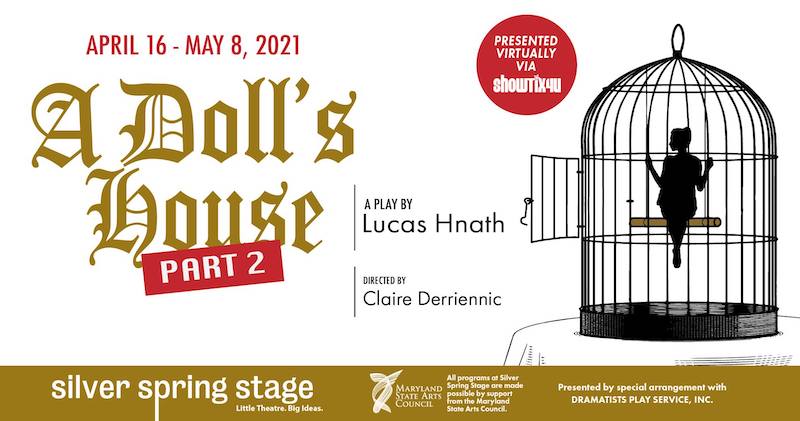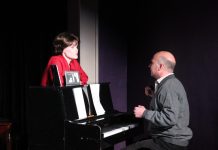Silver Spring Stage’s virtual production of A Doll’s House, Part 2 is an imaginative work with powerful performances. Lucas Hnath’s 2017 play picks up 15 years after Ibsen’s classic work ends, with Nora returning to Torvald’s home on a desperate mission. Directed by Claire Derriennic, it raises thoughtful contemporary questions about marriage and forgiveness.
Jacqueline Youm gives Nora a great complexity. She teases her children’s nanny, Anne Marie (Greta Boeringer), about what she thinks Nora’s life has been like since she left. She makes passionate arguments against marriage that even today feel controversial, favoring polyamory, and chafing against the legal restraints married women face. She is also manipulative, trying to convince Anne Marie and her daughter, Emmy (Sophie Isbell), to have Torvald (David Dubov) help her get out of a problem caused by her views on marriage: She suggests that Emmy make the idea sound like it comes from her. Nora can be aggravating as well, refusing to accept a noble gesture, and instead determined to be a martyr for her ideals.

Greta Boeringer plays Anne Marie with a fierce strength. At the start of her conversation with Nora she tries to play down any hard feelings, but senses early on with Nora’s questioning, “I feel like I’m being set up.” Anne Marie quickly speaks her mind, shocked at Nora’s ideas about marriage and trying to defend the institution. She also rails against Nora’s seeming ingratitude at Anne Marie’s raising of her children and is horrified at Nora’s suggestion that the two women are similar, having both left their children. She coldly tells Nora to leave the house.
David Dubov gives a quiet anger to Torvald, telling Nora “You left”—and that his only regret about her leaving was that “I didn’t leave first.” Yet he also acknowledges that his behavior had a role in her leaving. He makes a compelling argument that “epiphanies are easy. Working on the problem, that’s tough.” He refuses her request, responding to her threat with a fierceness. Dubov and Youm have great chemistry together, two strong personalities clashing against each other.
Sophie Isabell plays Emmy with a quiet independence. She recounts how she went about learning that Nora was not dead, as the theory around town went. She tells Nora she holds no bad feelings about her leaving, even suggesting that the responsibilities she had to take on made her a better person. She and Nora laugh together over a memory of Emmy’s brothers. But she challenges Nora’s request to help influence Torvald, proposing another option that would involve fraud. She says powerfully, “I know nothing of marriage, but I know of its absence” because of what Nora did. Isbell and Youm give their scene a slowly growing emotional power.
Set Designer Emily Smith has created a simple yet colorful set that has the feel of animation, with pink walls and green wainscotting, lending a sense of unreality to the production. Properties Designer Kira Burri fills out the stage with a pink chair, small table, a drink for Torvald, and a basket of sweets. Costume Designer Erin Bone Steele, who also does the hair and makeup, distinguishes each character with their own outfit. Nora stands out in a pink dress, white feather hat, mink stole, and pink parasol, while Anne Marie has a simple smock and white cap. Torvald is dressed for business in a tan fedora and grey jacket, while Emmy wears a long pink skirt and white shirt.
Lighting Designer Steve Deming keeps the lights high enough so that the actors are clearly seen. Sound Designer Javon Jones includes the sound of a doorbell ringing and adds to the surreal feeling with a music-box song as characters enter and exit, as well as at the play’s start and end. Claire Derriennic does a wonderful job as director, giving the actors opportunities to create the illusion of physical interaction by passing sweets and papers back and forth, while also allowing them to get close to the camera during emotional scenes. The actors work well together, creating intimate, powerful performances. While this viewing did not include a 10-minute intermission mentioned in the program, the continuous performance kept the momentum and energy going. A Doll’s House, Part 2 is a thought-provoking production connecting Ibsen’s play even more to our own times.
Running Time: Approximately 2 hours, with no intermission.
A Doll’s House, Part 2 is available for streaming through May 8, 2021, on Silver Spring Stage’s website. For tickets and information on this and future productions, please visit their website.





